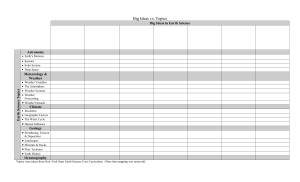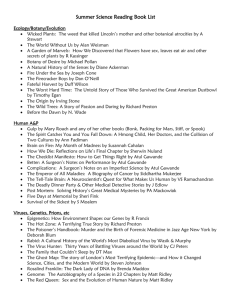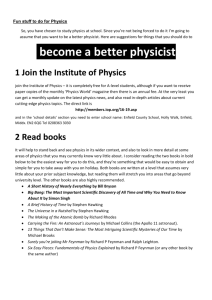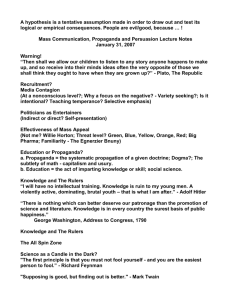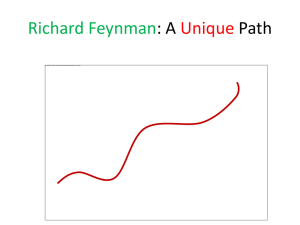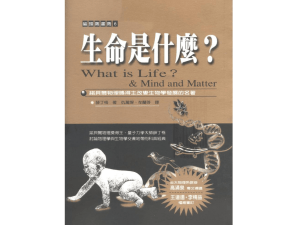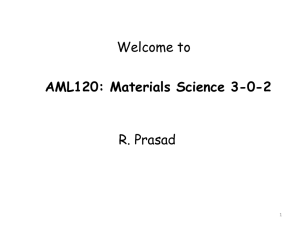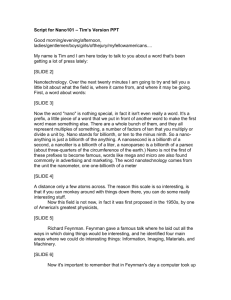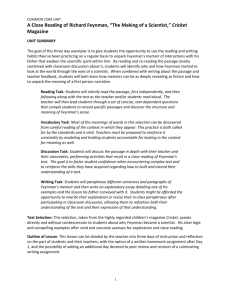richard+p+feynman
advertisement
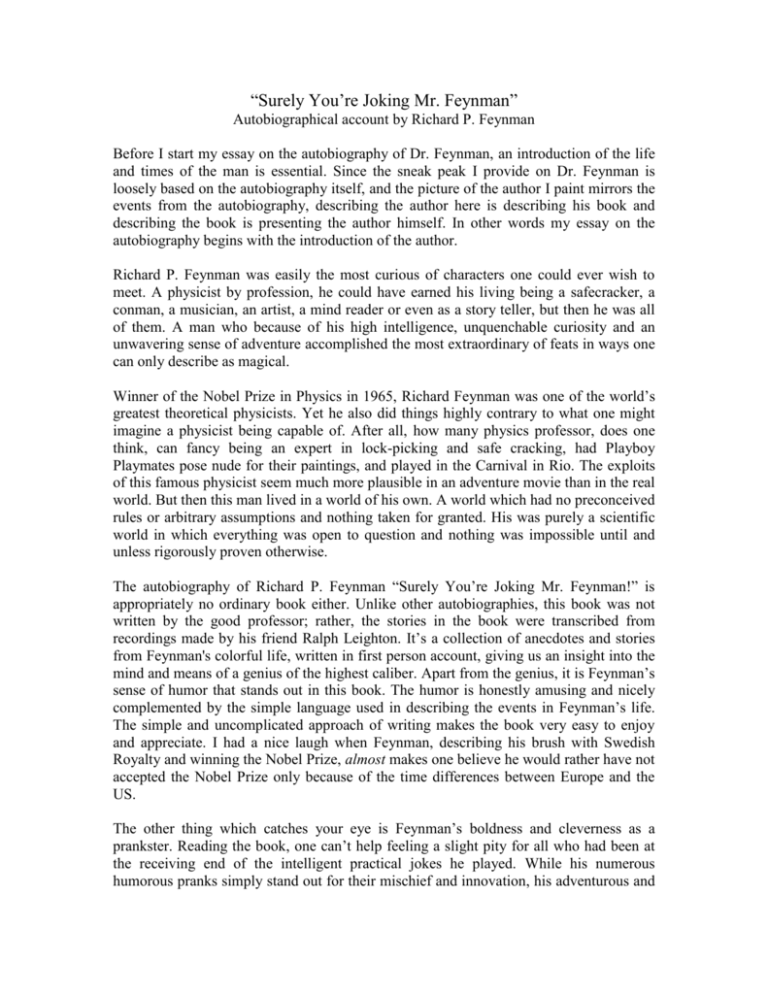
“Surely You’re Joking Mr. Feynman” Autobiographical account by Richard P. Feynman Before I start my essay on the autobiography of Dr. Feynman, an introduction of the life and times of the man is essential. Since the sneak peak I provide on Dr. Feynman is loosely based on the autobiography itself, and the picture of the author I paint mirrors the events from the autobiography, describing the author here is describing his book and describing the book is presenting the author himself. In other words my essay on the autobiography begins with the introduction of the author. Richard P. Feynman was easily the most curious of characters one could ever wish to meet. A physicist by profession, he could have earned his living being a safecracker, a conman, a musician, an artist, a mind reader or even as a story teller, but then he was all of them. A man who because of his high intelligence, unquenchable curiosity and an unwavering sense of adventure accomplished the most extraordinary of feats in ways one can only describe as magical. Winner of the Nobel Prize in Physics in 1965, Richard Feynman was one of the world’s greatest theoretical physicists. Yet he also did things highly contrary to what one might imagine a physicist being capable of. After all, how many physics professor, does one think, can fancy being an expert in lock-picking and safe cracking, had Playboy Playmates pose nude for their paintings, and played in the Carnival in Rio. The exploits of this famous physicist seem much more plausible in an adventure movie than in the real world. But then this man lived in a world of his own. A world which had no preconceived rules or arbitrary assumptions and nothing taken for granted. His was purely a scientific world in which everything was open to question and nothing was impossible until and unless rigorously proven otherwise. The autobiography of Richard P. Feynman “Surely You’re Joking Mr. Feynman!” is appropriately no ordinary book either. Unlike other autobiographies, this book was not written by the good professor; rather, the stories in the book were transcribed from recordings made by his friend Ralph Leighton. It’s a collection of anecdotes and stories from Feynman's colorful life, written in first person account, giving us an insight into the mind and means of a genius of the highest caliber. Apart from the genius, it is Feynman’s sense of humor that stands out in this book. The humor is honestly amusing and nicely complemented by the simple language used in describing the events in Feynman’s life. The simple and uncomplicated approach of writing makes the book very easy to enjoy and appreciate. I had a nice laugh when Feynman, describing his brush with Swedish Royalty and winning the Nobel Prize, almost makes one believe he would rather have not accepted the Nobel Prize only because of the time differences between Europe and the US. The other thing which catches your eye is Feynman’s boldness and cleverness as a prankster. Reading the book, one can’t help feeling a slight pity for all who had been at the receiving end of the intelligent practical jokes he played. While his numerous humorous pranks simply stand out for their mischief and innovation, his adventurous and bold antics; whether successfully flirting with the bar girls or playing the bongo drums for a ballet, are a complete show stopper. One just can not stop smiling while flipping through the life of this highly humorous, sometimes bawdy yet brilliant professor. His use of simple language in the book can be compared with what Gandhi employed in his ‘Story of my Experiments with Truth’. In fact the similarity between the two books and the authors goes further than that. Like Gandhi, the first person account by Feynman is very humble. He never assumes himself to be extraordinary or divinely gifted, though the events he describes may prove otherwise, but gives his precise and pragmatic scientific approach as the reason behind his accomplishments. Thus one might feel as if his feats may have been something of a child’s play. An extremely curious child who driven by his sense of fun and adventure and using his commonsense tinkered around with people and objects alike and ended up doing something magical. But then these ‘magical’ results of his endeavors holds one spellbound, knock one back into reality and the truth of one’s total inability in front of this great genius dawns. Another interesting but peculiar similarity with Gandhi is Feynman’s experimentation on himself. Though not in the name of moral righteousness or discovering the ‘truth’ as Gandhi did, but for scientific discovery. He wanted to know more about the states of human consciousness and unconsciousness. He tried to explore and verify facts about human dreams, hallucinations and their relation with the conscious world, with the main subject of his experiments being himself. Feynman was very curious about the intricacies of the working of the human mind. Throughout his life he tried different experiments to learn more and more about the mechanism for thinking, consciousness and dreams in humans. It is interesting to note the above similarities as evident from the autobiographies of two great men. Of course Feynman and Gandhi would have been totally opposite on several other counts but the similarities certainly make very interesting reading. To mention some of the not so good points of the book; the memoir lacks a sense of time. There is very little fluidity in the events described. The experiences mentioned are in somewhat random order and there isn’t very tight chronological ordering of the events. Also some of the experiments that Feynman tries to explain end up sounding vague, making them hard to visualize. But then the good points about the book far outnumber and outweigh the bad ones, and once started the book feels ‘unputdownable’. The final verdict on the book will have to be of a sure shot winner. It is refreshingly honest, iconoclastic, thought-provoking, one-of-a-kind classic and a must read for everyone. I thoroughly enjoyed reading the book for my assignment and hope that the essay I have just completed does some justice to it. Rishi Bhardwaj 01010118 8th Semester Student Inventing the Truth: The Art and Craft of Autobiography
